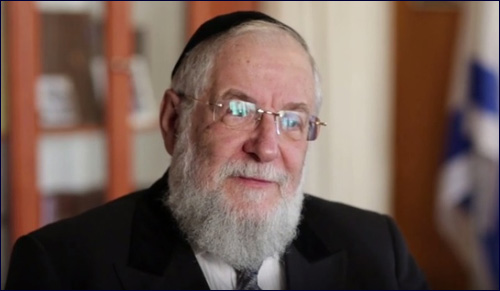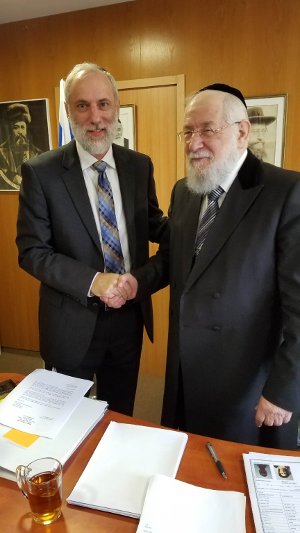 An Open Letter to University Presidents
An Open Letter to University Presidents


8 min read
A thought-provoking conversation with the esteemed rabbi.
Rabbi Yisrael Meir Lau served for 10 years as the Chief Rabbi of Israel and is currently in his 20th year as Chief Rabbi of Tel Aviv. At age 8, he was the youngest person liberated from the Buchenwald concentration camp (as chronicled in his Holocaust memoir, Out of the Depths) and today serves as the Chairman of Yad Vashem, dedicated to preserving the memory of the Holocaust for future generations.
Rabbi Lau spoke with Aish.com at his office in Tel Aviv, in anticipation of the upcoming Aish HaTorah Conference on November 17-19 in New York, where Rabbi Lau will be a keynote speaker.
Aish.com: So many young Jews feel disconnected from Israel and their Jewish heritage. As the 38th generation in an unbroken chain of rabbis, what is your message to these young Jews?
Rabbi Lau: In athletics, there is an idea of a relay race. You run 100 meters, then transfer the baton to the next runner. In the times of the Maccabees, there was not a baton, but rather a torch. For the Jewish people, fire has great significance: Torah is called “a fiery law” (Deut. 33:3), hence Aish HaTorah – the fire of Torah. Fire gives light and warmth. That torch of Jewish tradition was passed from generation to generation, for nearly 4,000 years since the time of Abraham.
You are a participant in the relay race of the generations. Will you extinguish the flame or transfer it?
I would say to a young person: The torch is now in your hands. You are a participant in the relay race of the generations. Will you extinguish the flame, or will you transfer it to the next generation? All previous generations have passed along this heritage, entrusting you to likewise pass along what you have inherited. Look in the mirror and ask: Is it fair to extinguish the flame? You don't owe me anything, but you owe yourself an answer.
Aish.com: In Europe, anti-Semitism is worse than it's been for many years. Consider a young Jew living in France, for example, who doesn't speak Hebrew, and whose family, friends and career are in France – yet is concerned about his future there. What will convince him to feel that his future is in Israel?
Rabbi Lau: You cannot love or appreciate something you don't know. Just like when choosing a marriage partner, you need to ask a lot of questions, to look deeply into the other person's eyes, to understand the depth behind them. Do you feel a connection, or not?
So the answer is to spend some time in Israel. To travel, meet the people, visit the Western Wall, study the history. Then your decision will be made.
Moses greatly desired to cross into the land of Israel, but was not privileged to fulfill that dream. We have the opportunity to achieve what even Moses did not. Understand God's command to Abraham: Lech Lecha – "go to the land which I will show you." Understand why Isaac was careful to never step foot outside of Israel. Study the history of Jewish communities in Russia, Iraq – even France during the Holocaust – and so many diaspora communities who suffered over the centuries. Israel has an unbroken chain of Jewish settlement since the time of King David. Understand your connection to that.
Aish.com: Today in Israel there is tension between religious and secular Jews. What can we do to improve the situation, to bring the sides closer together?
Rabbi Lau: There is no easy solution. It is a long, long way. For secular Jews, Shabbat is the main problem. They say: “What business do you have telling me there are no busses or trains on Shabbat? This is religious coercion! You can go to the synagogue, but let me live."
Unfortunately, the perception of many secular Jews is that Shabbat is all about “what is forbidden.” It is forbidden to light a cigarette, forbidden to drive a car. Electricity is forbidden, cooking is forbidden, writing is forbidden. It is forbidden to use the telephone, do laundry, watch TV or listen to the radio. It is forbidden to go swimming or go shopping. Forbidden, forbidden, forbidden!
The problem is that one only hears about the restrictive side of Shabbat and not about beautiful, positive side of Shabbat. The lighting of the candles, welcoming Shabbat with "Lecha Dodi," reciting Kiddush at the beautiful Shabbat table, the singing of Shabbat songs. He doesn't understand the depth and wisdom of the weekly Torah portion.
One cannot accept Shabbat if he has never tasted Shabbat. First experience Shabbat, then decide if that speaks more to your heart than the beach or shopping. We have six other days for those activities.
The two aspects of Shabbat – positive and negative – were spoken at Mount Sinai in a single utterance. In the Torah, the positive aspect (Zachor) is written in the first account of the Ten Commandments (Exodus 20:8), and the negative aspect (Shamor) is written in the second account (Deut. 5:12). It is not coincidental that the positive comes first. But a secular Jew, on the outside looking in, sees only the negative.
In previous generations, non-religious Israelis at least had grandparents who observed a traditional Shabbat. On summer vacation, when visiting their grandparents, they would see the lighting of Shabbat candles and would taste chollent (the special Shabbat stew). Unfortunately, such opportunities to experience Shabbat are more rare today.
The solution is in our hands. We need to invite people into our home, to show them the beauty of a Shabbat table. We can gently ask: “What have you got to lose? It doesn't cost anything. It doesn't hurt. Come once and see.” The invitation alone conveys the feeling that you care.
A few years ago, Israel's Interior Minister, Gideon Sa'ar, a non-observant Jew, was in a position to sign a new Tel Aviv law permitting supermarkets to be open on Shabbat. On the holidays of Shavuot and Rosh Hashana, Gideon and his wife were guests in my home.
I asked him to consider: Who are the workers in the supermarket? Who is the stock boy? Who is the checkout clerk? Who is the security guard at the door? Who cleans the floors? They are new immigrants from Russia and Ethiopia, and university students who need to pay their expenses. The entire week they work like slaves. And if they will say, "I cannot work on Shabbat," the supermarket will reply, "Then we don't need you."
 Rav Lau and Shraga Simmons
Rav Lau and Shraga Simmons
Meanwhile, the owner of the supermarket is vacationing in Monte Carlo. He needs the stores open on Shabbat because he needs more money. It's not enough a private plane; he also needs a private yacht. At least one day a week, the "people of the book" should not be defined as the "people of commerce."
There are many reasons for statewide Shabbat observance - religious, social and national. As the testimony to Creation, Shabbat is the foundation of monotheism. Shabbat commemorates the Exodus from Egypt, our liberation from slavery. Shabbat is the great equalizer among people – there is no social gap; no "boss and employee." Shabbat provides rest for the body and elevation for the soul.
The first mayor of Tel Aviv, Meir Dizengoff, determined that all stores and attractions must be closed for the duration of Shabbat. Dizengoff was secular, but he understood: Anyone who harms Shabbat, he said, harms the unity of the Jewish people.
In Israel, children go to school six days a week. During the week, there is limited time for families to sit and talk - parents and children, husband and wife. The only day off is on Shabbat. That is the day to build family unity.
But what if the parents are working at the supermarket? On the one day that children have no school, parents are working to fill the pockets of the business owners, rather than spending quality time with their children. Is this fair? Is this the fulfillment of our dream to return to the Jewish homeland after 2,000 years?
As in the case of the biblical Esau, let us not exchange our most important values "for a bowl of lentils."
This is what I told Gideon Sa'ar. And when the authorization to open supermarkets on Shabbat came to his desk, he did not sign.
Register now for the amazing Aish HaTorah Conference and have the chance to meet Rabbi Yisrael Meir Lau, as well as his son David Lau, the current Chief Rabbi of Israel. Plus, you can meet the Chief Rabbi of South Africa, Warren Goldstein, and dozens of top educators and Jewish leaders from around the world – to learn how you can help set the future course of the Jewish people. It’s taking place Nov. 17-19 in Stamford, CT.
Rooms are filling up fast. For any questions, please feel free to email conference@aish.com or visit our website at www.aishconference.com/.
